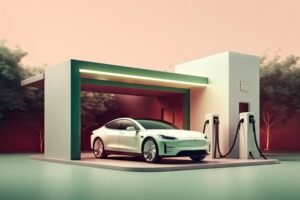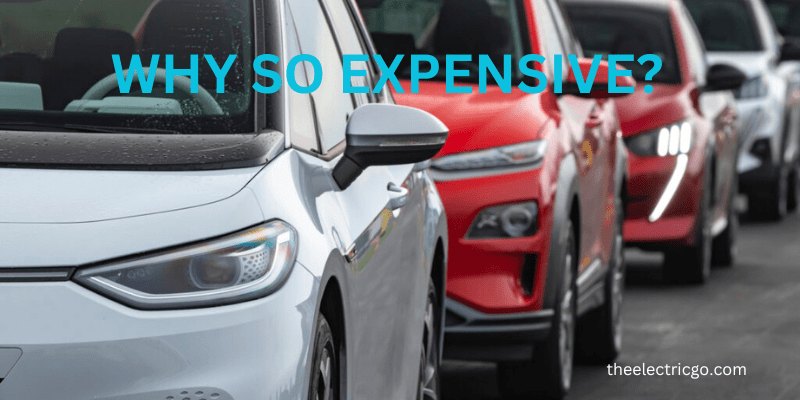Why are electric cars so expensive : Not ready for the Masses
Can you imagine why electric cars cost so much money? Here we’re now going to explore this! Electric cars are everywhere now. However, one thing that still discourages many potential buyers is their high price tags.
But fear not, we are here to resolve this confusing problem. In this article, we will check out a detailed explanation as to Why are electric cars so expensive? It is from technology to manufacturing that we will be elaborating each step in detail.
However, the end of this article will help you to learn why electric cars are costly and if they are worth it or not. So get ready to ride electric vehicles with us! It promises to be an exciting journey!
Technological Advancements:

All right, the next topic concerns the cool tech features of electric vehicles. One of the causes that makes them expensive is the technology on the inside of them, which is very advanced. Batteries are crucial for electric vehicles, but the improvement of those is not cheap. Along with this, the motors used in electric cars are incredible and strong.
However, their production is not cheap either. Also, they have decent software that makes electric cars work perfectly. To make it and put it all together takes a lot of money. Thus, that’s why electric cars are very expensive.
Manufacturing and Production:
Now, let’s focus on how electric cars are manufactured. So, assembling electric cars is like putting together a jig-saw that has really cool pieces. The other reason they are expensive is that they are not in mass production, and each piece costs more. In addition, the construction of the factories to produce electric vehicles is not at all cheap.
They usually spend a lot of money building new structures or renovating existing ones. In short, that’s why manufacturing electric cars is so costly, you get the idea. Since every single component, from the pieces to the factories, costs a decent amount.
Supply Chain Challenges:
Let’s discuss a concept called supply chain. It’s as if the electric car were a great chain of people and places that make electric cars. Sometimes it’s hard to keep up with the flow of thought. For example, it can be challenging to get high-end parts for electric cars, like batteries. At times prices of such items increase and decrease, making it difficult for businesses to maintain low costs. Moreover, consider a scenario where a factory is closing its operations that are far away from your location. Such incidents have the potential to break the chain, making things more difficult and costly to get.
Government Regulations and Incentives:

So, what does the government have to do with electric cars? Hence, you already have an idea of how the government makes regulations about many issues. Besides that, they also create regulations for vehicles (i.e. electric ones).
At other times, these regulations are about the number of polluting cars allowed, and this can make it harder and more expensive for firms to manufacture electric vehicles. But here’s the cool part: at other times, the government might also pitch in! They give companies money or breaks on taxes to help the companies reduce the price for us to buy electric cars.
Hence, the governments may make the process more difficult as well as easier for those who use electrical cars.
Infrastructure Development:
Let’s discuss the necessary components for electric vehicle operation. It is known as infrastructure, and it’s critical. Do you know where you would plug in to charge your electric vehicle?
Now comes the role of infrastructure. But building up all these charging points is very expensive. This is not just a problem but there is also the issue of electricity being enough to power these cars.
Therefore, for more users to want electric cars, we should build more infrastructure. Additionally, this results in more money. Consequently, providing infrastructure for electric cars needs to be done on a big scale, and it is costly.
Total Cost of Ownership:
Let’s have a look at the monetary side of having an electric car. It is not about the tag it comes with when you purchase it. There’s more to it. Imagine that you own a car and you have to pay for the gas, don’t you?
But with electric cars, you won’t need gas, and therefore, you will save your money. In addition, they do not require repairing as much as regular cars do, which is another boost for your budget.
What’s more, the ongoing shift toward electric cars will hugely benefit the environment, which is the best thing you can ever imagine. Similarly, therefore, although electric cars cost more when new, their operational costs can add up to a significant figure.
Future Outlook:
Next, we take a sneak peek into what the future of electric cars will be. Although they’re costly at present, it may be different in the future. As technology advances and more people purchase electric cars, prices may decrease. The government may introduce new laws and create additional incentives to help out as well further.
Moreover, firms will continue to explore methods to minimize production costs. So, who knows? Everybody will be using electric cars, and they won’t be outrageously expensive.
Also Read: Which Electric Cars Have the Longest Range?
Frequently Asked Questions:
Why are electric cars more expensive than traditional gasoline-powered vehicles?
The core selling point of electric cars is that they bear a higher price than regular vehicles, even though the main reason for this can be traced down to the incredible technology that has been incorporated into the vehicle design, specifically the batteries.
Do government incentives actually make electric cars more affordable?
The shift to EVs depends significantly on government incentives, including tax credit schemes and subsidies, that help to bring down the initial purchase costs for consumers. Nevertheless, the effect of this scheme on different regions is diversity, which is based on its regional policies and market dynamics.
Are electric cars cheaper to own and maintain in the long run?
However, they have higher initial costs, but in terms of the lower total cost of owning an electric car over time, EVs are usually more economical than gasoline-driven cars. Electric vehicles provide many benefits to their owners over time, making them a popular choice for many consumers due to their lower fuel costs, reduced auto maintenance costs, and tax breaks.
Conclusion:
In conclusion, the high cost of electric vehicles is caused by a combination of technological developments, manufacturing difficulties, supply chain complexities, government regulations, and infrastructure requirements. Even though these aspects are the initial cost, the long-term advantages and the environmental benefits of electric vehicles are evident. With time, electric cars are becoming the consumer’s choice, which will open the door to a green transport society.
Watch YouTube Video Below

